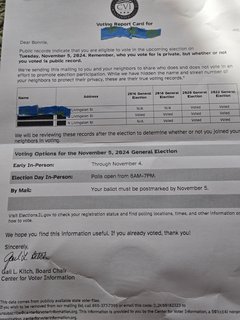Maryland
Related: About this forumState orders halt to mailings that left voters 'intimidated, shocked and ill-at-ease'
The Maryland Attorney General’s Office sent a cease-and-desist letter Thursday to a national voter engagement organization that the state says is sending out mailers that “threaten to publicly expose” voting records of Marylanders just days out from the 2024 election.
The attorney general’s letter is in response to an unsolicited “Voting Report Card” being sent to people across the state by the Voter Participation Center, a nonprofit that claims it’s trying to drive more voters to the polls, specifically unmarried women, people of color and young voters. A sister organization, the Center for Voter Information, has also been sending out mailers.
The mailer that Marylanders have been receiving lists the voter’s name, address and voting records beginning with the 2016 general election. It also allegedly shows what it claims are voting records of neighbors, though names and addresses are censored.
The letter also states that the Voter Participation Center “will be reviewing these records after the election to determine whether or not you joined your neighbors in voting.”
https://marylandmatters.org/2024/10/31/state-orders-halt-to-mailings-that-left-voters-intimidated-shocked-and-ill-at-ease/
Silent Type
(12,412 posts)I got a bunch of texts before dropping off my ballot 10/24 from Democratic groups making sure I knew where to go, etc. Those I didn’t mind and thanked them for their efforts.
sinkingfeeling
(57,207 posts)It states, " We're sending this mailing to you and your neighbors to share who does and does not vote in an effort to promote election participation. While we have hidden the name and street number of your neighbors to protect their privacy, these are their true voting records."
Obviously the data came from the Illinois database since I have only voted here twice.

qwlauren35
(6,309 posts)But I'm not sure that it would "discourage" anyone unless they didn't know that *whether* they vote (not who they vote for) is public, and this new knowledge makes them feel like their privacy has been invaded.
If it does discourage people who feel violated, it will be hard to combat.